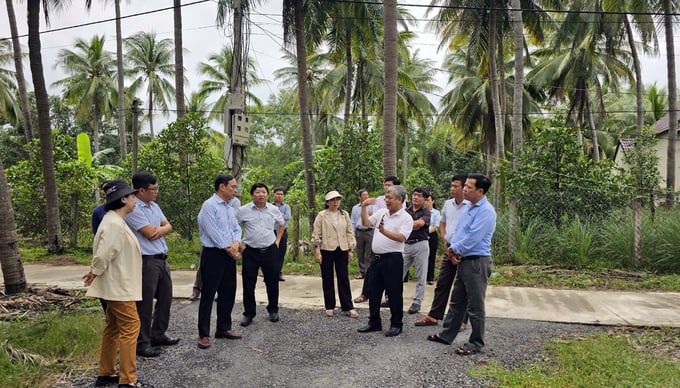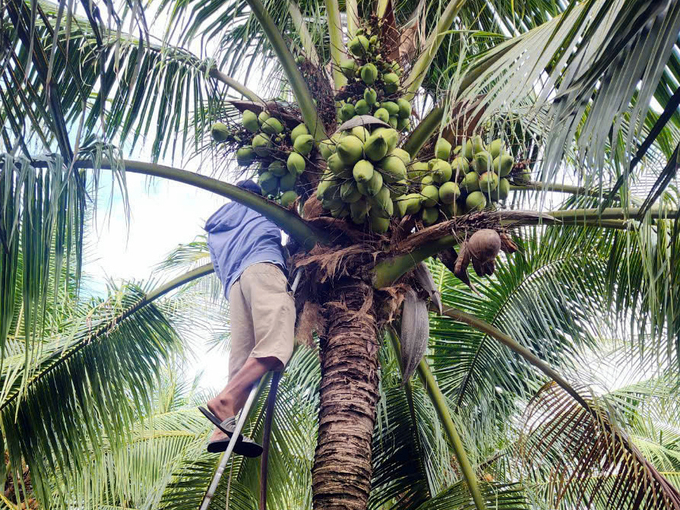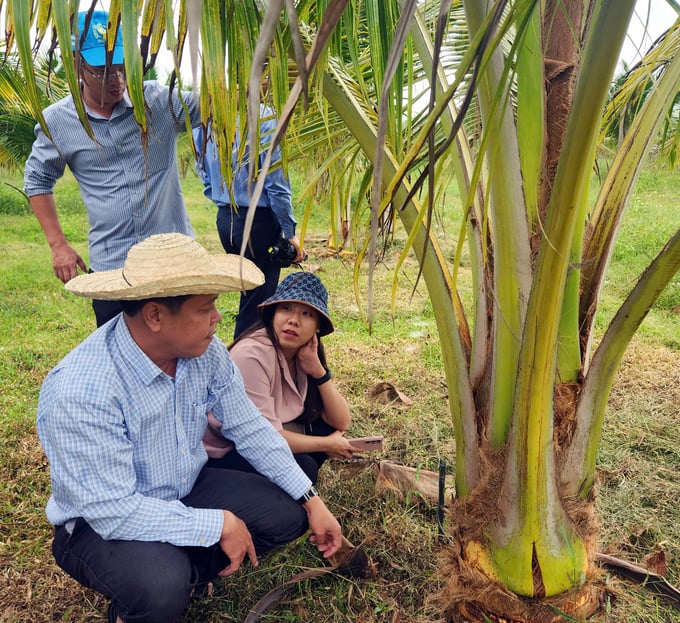June 18, 2025 | 18:42 GMT +7
June 18, 2025 | 18:42 GMT +7
Hotline: 0913.378.918
June 18, 2025 | 18:42 GMT +7
Hotline: 0913.378.918

Phu Yen Province's agricultural sector, in collaboration with the Agricultural Science Institute for Southern Central Coastal of Vietnam and the Nha Ho Research Institute for Cotton and Agricultural Development, has conducted surveys on the state of coconut cultivation in the region. Photo: NT.
Coconut is a versatile crop that can be harvested for fresh beverages, processed materials, handicrafts, or used for landscaping in tourism. The coconut tree demonstrates strong resilience to climate change, effectively absorbs carbon, and adapts to a wide range of soil conditions. Additionally, it requires low investment and cultivation effort.
Notably, the two largest economies in the world, the United States and China, recently approved the official export of fresh coconuts from Vietnam. Additionally, the Ministry of Agriculture and Rural Development (MARD) has recognized coconut as a national key industrial crop under Decision No. 431/QD-BNN-BNNPTNT dated January 26, 2024. Consequently, this approval holds significant opportunities for the development of coconut cultivation nationwide.
Phu Yen Province has a long-standing reputation for its coconut production in Song Cau Town. The province boasts favorable ecological conditions and a detailed development plan for coconut cultivation in its lowland districts and towns. As of the end of 2023, Song Cau Town housed 966 hectares of coconut acreage; this figure had decreased to approximately 890 hectares by March 2024. Local farmers mainly grow the traditional coconut variety, alongside a number of green and red husk coconuts.

A coconut production area in Song Cau Town, Phu Yen Province. Photo: NT.
According to Vu Van Khue, Deputy Director of the Agricultural Science Institute for Southern Central Coastal of Vietnam, farmers in Phu Yen Province cultivate coconut trees in a disorganized manner, with a limited number of concentrated farms. As a result, local farmers typically neglect intensive farming practices.
In response to this issue, Deputy Director Khue suggests that for existing coconut farms, primarily consisting of the local coconut variety, farmers should implement special cultivation measures such as trimming the top of the trees, creating planting basins, applying balanced fertilization, and providing adequate irrigation. Additionally, he encourages farmers to intercrop their trees with selected varieties of Xiem coconuts to gradually replace old, low-yielding farms. Notably, they should also consider cultivating low-canopy, shade-loving crops, such as fodder plants, alongside livestock and poultry production to increase income.
Regarding the development of new coconut farms, the province should focus on planting selected and improved coconut varieties, establishing clear land use plans, and applying good agricultural practices (GAP) and organic farming methods. After developing concentrated coconut production areas, Phu Yen should shift its attention toward building a brand, fostering linkages between stakeholders, and promoting local products.
Deputy Director Khue further noted the province needs to develop a project focusing on livelihood improvement for residents in the Song Cau coconut region, thereby facilitating the provincial coconut expansion plan. Moreover, Phu Yen must utilize national development funds or agricultural promotion grants to implement projects aimed at expanding coconut cultivation activities. Notably, it should conduct scientific research to identify the most suitable coconut varieties for the province and determine areas for concentrated production in combination with brand development.
According to Dang Thi Thuy, Deputy Director of Phu Yen Province's Department of Agriculture and Rural Development, Phu Yen issued Plan No. 187, dated October 9, 2024, to implement the key industrial crop development project until 2030, which also covers coconuts.
According to the plan, Phu Yen aims to expand its coconut acreage to approximately 1,500 hectares by 2025, with 1,300 hectares for harvesting. As a result, the province will produce an estimated 21,000 tons of fresh coconut every year. Additionally, the province will develop concentrated coconut production areas in Song Cau Town and Tuy An District. It will also focus on the promotion of landscape development and community-based tourism in key areas with advantageous conditions.

Coconut is one of the four key industrial crops for Phu Yen province by 2030. Photo: NT.
The province is focusing on cultivating high-yielding, economically valuable coconut varieties such as the green Xiem and Malaysian coconuts. It is also employing suitable intercropping techniques to increase production efficiency per unit of land.
"We expect that by 2030, approximately 30% of the local coconut farms will comply with GAP standards or equivalent, and around 30% of coconut production areas will have registered production unit codes," added Thuy.
On the other hand, the province is investing in equipment to diversify coconut-based products. It is also enhancing the processing of coconut by-products such as coconut husks, leaves, and shells to create eco-friendly products that attract tourists to Phu Yen, thereby increasing the value of the coconut industry and promoting environmental protection.
The province is also combining coconut production development with eco-tourism, farm-based tourism, and local culinary experiences. This includes the development of OCOP (One Commune One Product) products in Song Cau and Tuy An, as well as the promotion of coconut craft villages and production facilities that serve tourism. Phu Yen will organize tourism programs that offer visits to coconut-based craft villages and production facilities, which will showcase the production processes and encourage local coconut product consumption.
Phu Yen Province's Department of Agriculture and Rural Development recently signed a cooperation agreement for the sustainable development of the agriculture sector in the province for the years between 2025 and 2030 with the Agricultural Science Institute for Southern Central Coastal of Vietnam and the Nha Ho Research Institute for Cotton and Agricultural Development. Under this agreement, scientists will support the development of coconut cultivation in Phu Yen.
Translated by Nguyen Hai Long
/2025/06/17/3942-2-143243_548.jpg)
(VAN) Recently, in Sweden, the Secretary of the Binh Dinh Provincial Party Committee presented the Investment Registration Certificate for the 'Polyester Fabric Recycling Complex' project to SYRE Impact-AB Company.
/2025/06/12/3721-2-202745_83.jpg)
(VAN) TH made an impression at Seoul Food 2025 with its line of natural beverages, paving the way for Vietnamese food products to enter the South Korean market.

(VAN) Soc Trang's success in rice exports stems from a strategy of developing fragrant and specialty rice cultivation areas and standardizing production toward low-emission practices.
/2025/06/11/1311-5-120811_839.jpg)
(VAN) The pig farming industry is facing the challenge of comprehensive restructuring to meet requirements for quality, safety, traceability, and market expansion both domestically and for export.

(VAN) Vietnam considers participating in ALGROALBA in order to expand agricultural production, coordinate the assessment and effective exploitation potential land.
/2025/06/05/5314-1-184727_407.jpg)
(VAN) From seemingly worthless fish scales and skin, enzymes and lactic ferments can transform by-products into peptides, opening a sustainable, effective business direction and elevating Vietnamese seafood.

(VAN) TTC AgriS and IFC signed a strategic partnership to develop a sustainable agricultural value chain, aiming to achieve the Net Zero target by 2035.